Staff Reflections
Angels Unawares
“Be not forgetful to entertain strangers: for thereby some have entertained angels unawares.”
-Hebrews 13:2
There are few things more mysterious, frightening, and wonderful than an encounter with the divine. I wonder from time to time how I might respond. I wonder what I might learn about God and the world around me—about myself. I believe this is something we were created to both think about and, in certain ways, to experience.
The last year has been one of great transition and lifestyle change for my wife, Morgan, and me. Last Summer, we moved back to our hometown of Memphis, TN and I began my role with volunteer engagement at the local World Relief office. Between our transition and the impact of world events like the Afghanistan crisis on my work, we decided this was the year to book the trip to Italy we have wanted to take for some time now. I was very much looking forward to new experiences and to recharging by unplugging briefly from refugee resettlement matters which had consumed so much of my focus in the past year.
During our tour of Rome, we visited the Vatican City where we saw some of the most amazing religious artifacts and structures imaginable. But it was the piece we saw as we exited through St. Peter’s Square which provided the most spiritually intense experience of the day. Morgan caught a glimpse of a large, dark statue in the corner of the square which we proceeded to investigate. The structure resembled a small vessel, like an escape boat, crowded with people of all forms and origins. The name of the work was “Angels Unawares” and you can read more about it here. I won’t exhaust you with description but I will note that, as alluded to by the title, there is a lone pair of angel’s wings protruding from the crowd.
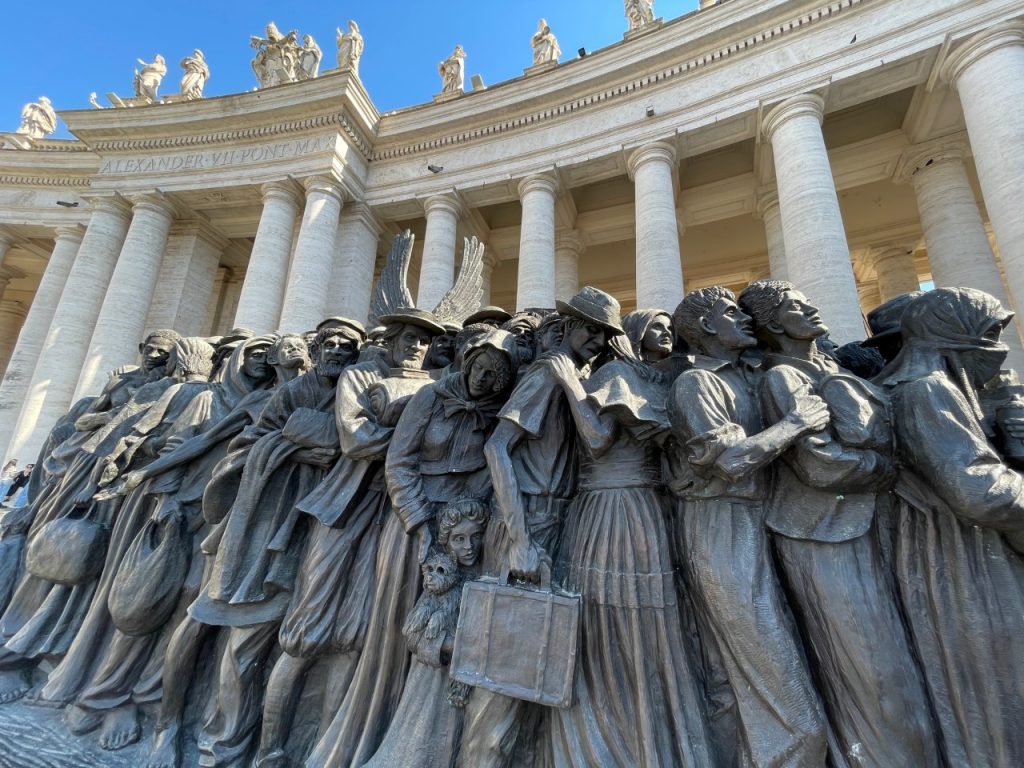
The sculptor, Timothy Schmaltz, describes his works as “visual prayers” and, whatever that means, I certainly felt it as I stared and pondered. I saw the faces depicted of immigrants and refugees from different centuries, cultures, and continents. Each face told a story—hope, fear, loss, dreams. In the center, the two wings, a reminder that where these people go, a divine presence is surely with them. This symbolizes what is written in Hebrews 13:2 that when we welcome strangers, we may in fact be welcoming angels.
For a long time, I was so puzzled by that passage. To some degree, it certainly is still mysterious. But when we look at the bigger message of God’s Word, I think we see a theme that helps us make sense of this biblical detail. Why would God have us entertain angels? Are these actual heavenly creatures being referred to? Why would they disguise themselves among strangers and foreigners?
To me, the heart of the answer lies with the person of Jesus himself. When God became a man, he took on the lowliest status (Phil. 2:6-8). In doing so, he taught us that those who are lowly possess indispensable value. Why come to us in a form we might perceive as less valuable if not to change our perception of a person’s value?
Our Christ was carried to a foreign land by his parents for fear of death (Matt. 2:13-23). This detail of Jesus’ life not only fulfilled an important prophecy but also proves to us that those who leave one country for another carry with them stories worth understanding. Why write this unique story into the life of our Savior if not to challenge us to understand the stories of those who sojourn among us?
Hebrews 13:2 suggests to us that our care for the foreigner is an encounter with the divine. If this seems like a radical insinuation, consider that Jesus took this idea even further when he described the final judgement in Matthew 25:35-40:
“For I was hungry and you gave me food, I was thirsty and you gave me drink, I was a stranger and you welcomed me, I was naked and you clothed me, I was sick and you visited me, I was in prison and you came to me.’ Then the righteous will answer him, saying, ‘Lord, when did we see you hungry and feed you, or thirsty and give you drink? And when did we see you a stranger and welcome you, or naked and clothe you? And when did we see you sick or in prison and visit you?’ And the King will answer them, ‘Truly, I say to you, as you did it to one of the least of these my brothers, you did it to me.’”
There is no question that Jesus has closely and permanently linked our pursuit of a holy life with care for the alien in our midst. There is something about compassion toward the vulnerable so integral to the heart of God that he placed them squarely on our narrow path to eternity with no way around them. Surely, if we want to encounter Christ himself, we must do so with the immigrant and the foreigner at our table. These promises also confirm to us that—when we inevitably experience vulnerabilities for ourselves—Jesus sees us, is near to us, and his love is directed to us.
I walked away from St. Peter’s Square that day challenged in regard to my daily life. But I also walked away hopeful because I was reminded that God has given me a very clear blueprint for how to receive and give his love in a practical way. When I welcome a stranger and love them as a neighbor, I am certainly welcoming Jesus himself into my rhythm of community. I might also be welcoming his angels—and what a blessing that would be.
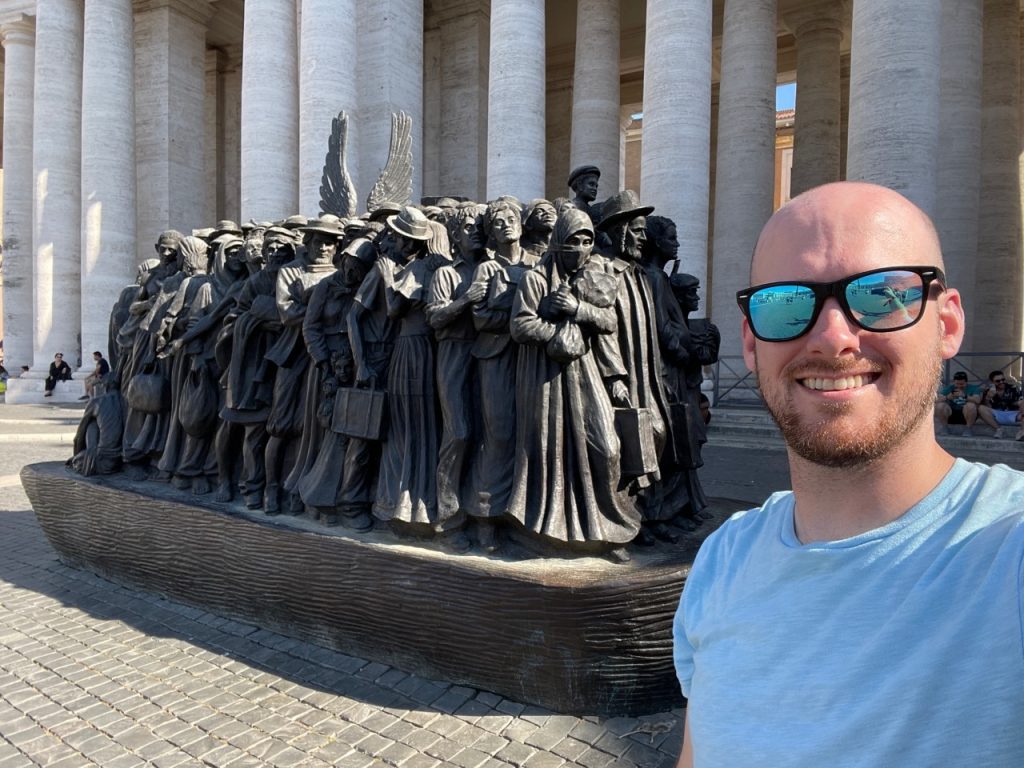
Author: Carter Brinkley
Volunteer Coordinator at World Relief Memphis
If you are interested in learning more about what we do here at World Relief Memphis, join us for one of our monthly volunteer orientations:
Feeling called to make an impact but can’t donate your time? Learn more about joining our monthly giving program The Path.
A Welcome from Ukraine
I had been to Sea-Tac airport many times before, but this night was different. I was now a World Relief staff member, and for the first time, I was meeting a family resettling in the U.S. after being forced from their home country.
The first step was connecting with Ana, the sister of the arriving family. I crept forward in the stop-and-go traffic, inching toward the arrivals. With each stop, I sent a text, “I’m getting closer.” “Should I bring the booster seats in or can I meet at your car?”
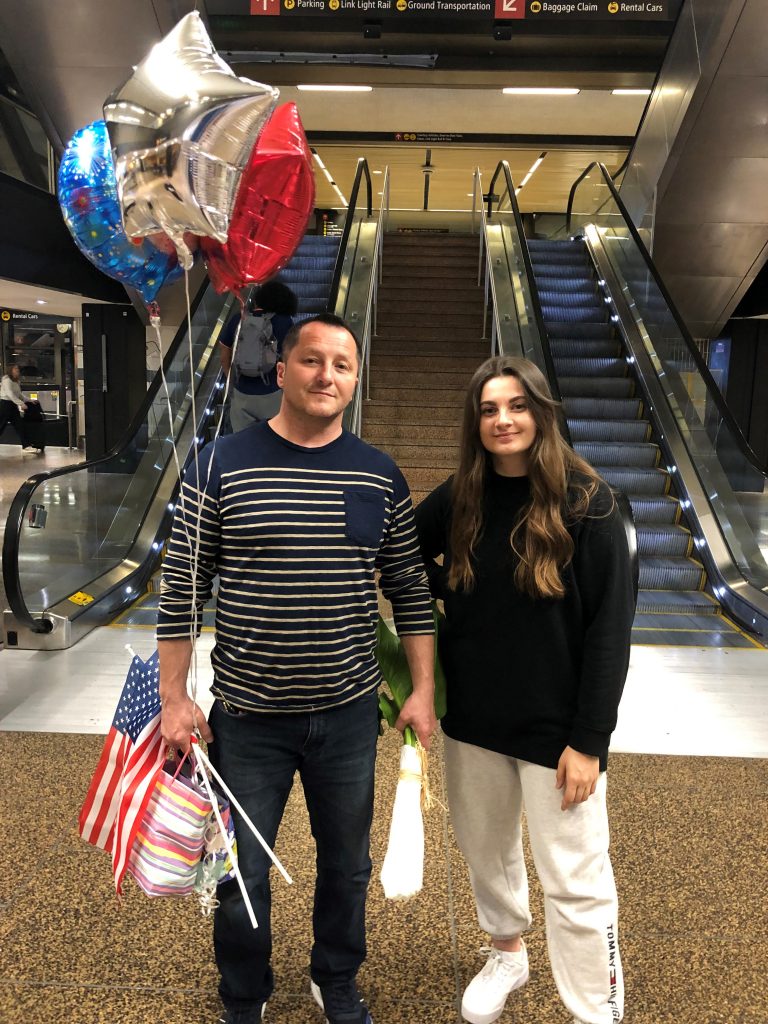
ANA
Ana had just arrived to the U.S. from Ukraine on February 2, 2022 – right before the war broke out. For four years, she had waited for her application to come to the U.S. to be approved, after experiencing persecution for her Pentecostal Christian faith. Now Ana was ready to welcome her sister Luda, her brother-in-law, and her two nieces to their new home.
Ana and her uncle rolled up in their minivan, “Are you Liz?” We transferred the two booster seats, so the 4 and 6-year-old daughters could safely make the final leg of their 40-hour journey. Ana popped out of the car with a smile, two treat bags brimming with candy, a bouquet of Calla Lilies, two U.S. flags, and a bunch of red, white, and blue balloons.
ROMAN
Roman, Ana, and I waited at the bottom of the escalator for the family to arrive, and they recounted some of their stories. Roman had fled Ukraine in 1995 and resettled in the U.S. as a refugee. It pained him to see Ukrainians suffering even after all these years from Russia’s military; “they don’t care if it is soldiers or civilians… they have been raping and killing and bombing…” I could hear the pain and disappointment in his voice as he reflected on the horrors facing those who remained in the country.
His church in the U.S. has gathered together to regularly send money, supplies, and relief to those throughout Ukraine. Tonight, he got to welcome some of his family to safety in the U.S. even as he continues to care for those still in Ukraine.
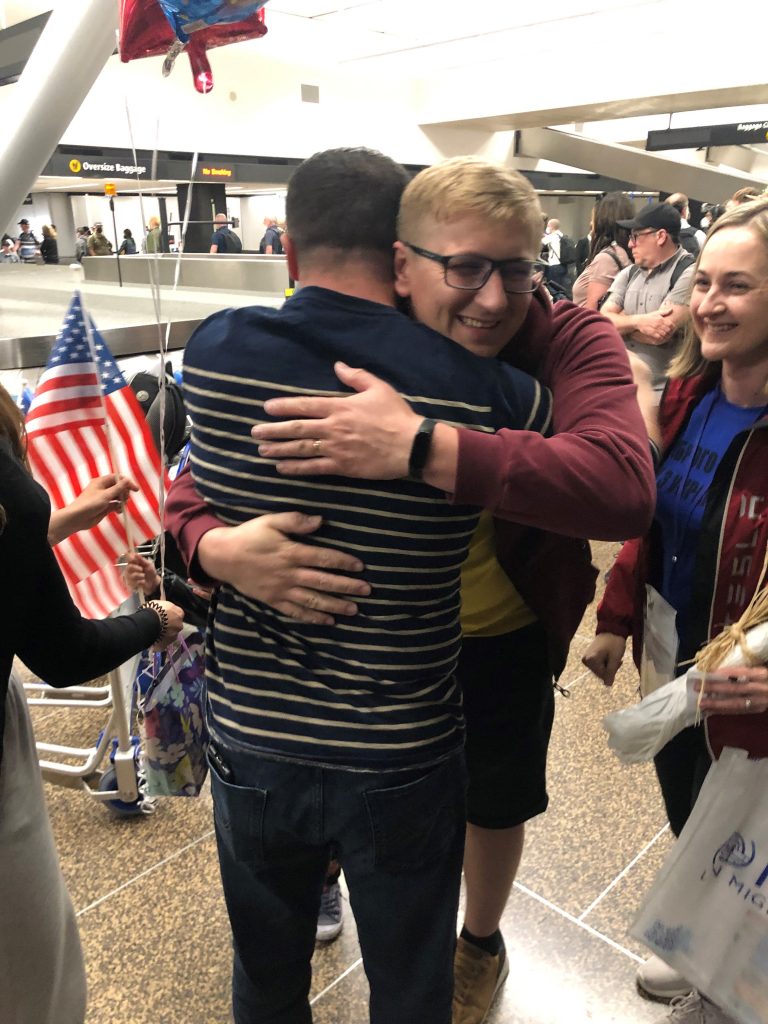
LUDA & FAMILY
Ana was busy texting and making calls, trying to connect with her sister. We got news they bypassed our escalator and made it to baggage claim carousel 5. Ana rushed with the balloons trailing behind her, gently bumping a few passerbys in their wake.
We turned a corner and saw the matching blue and yellow Ukraine shirts Luda and her family had made for their journey. Ana hurried in for a warm hug with her sister. “I can’t believe you are here. Is this really you in the flesh?” she said with a laugh and a few joking probes to confirm her presence. Ana had seen her sister before she had left Ukraine, just about 4 months ago. But 4 months of war had felt like a lifetime – constantly worrying that the bombing would land in her sister’s town.
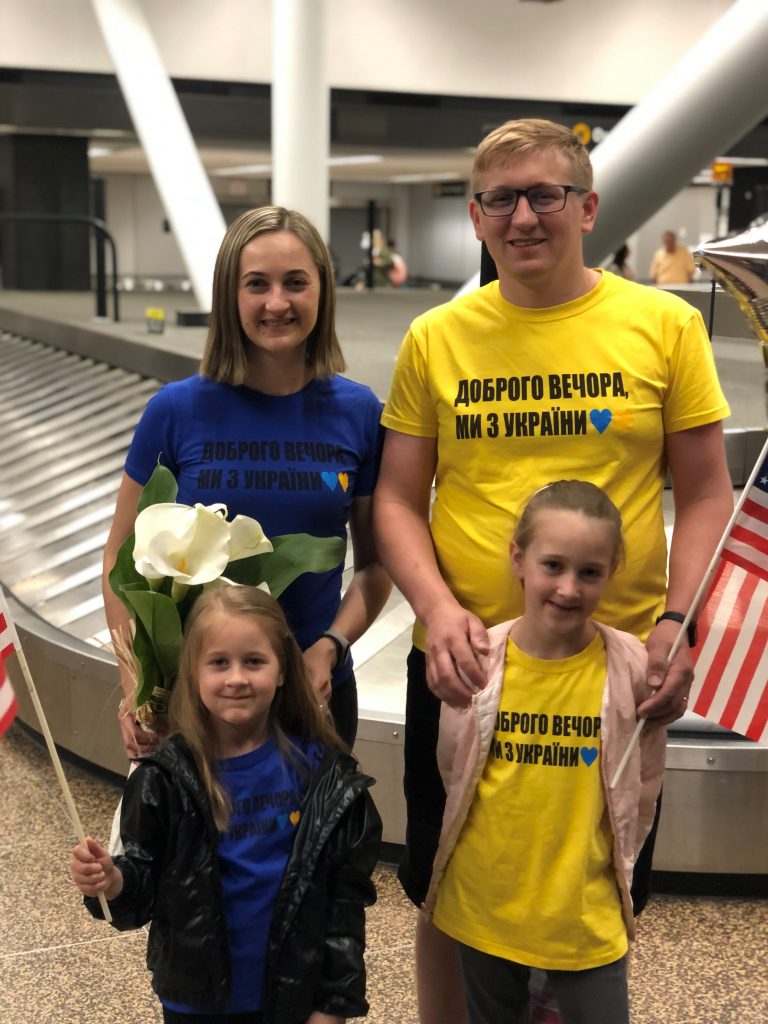
Like Ana, Luda and her family had faced persecution for their faith prior to the war, and had been waiting 4 years to resettle to the U.S. Finally, she was given a travel date in May, but then Russia invaded Ukraine, and the airports throughout the country were bombed and shut down. They didn’t know if they would ever make it.
Luda, her husband, and her two girls fled to Moldova, rescheduled their flights, and finally arrived in Seattle that night of June 9, 2022. The girls embraced their aunt, dug into the candies she shared, and joyously waved the American flags. They shared stories in Ukrainian as we waited for their final bag to pop out on the carousel.
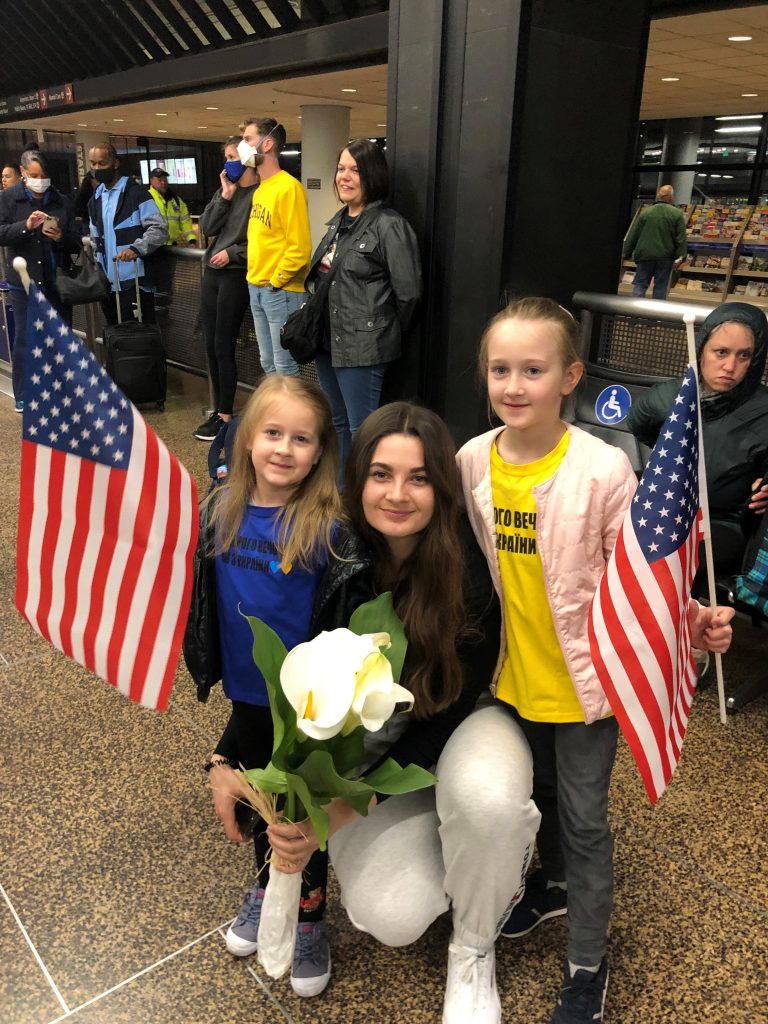
LIZ
For me, I stood by taking it all in, knowing the privilege it was to share this important moment with these families. I was an outsider, but the welcome they gave me into their family in that moment showed me a piece of what reciprocal welcome and hospitality is all about. It wasn’t about me bringing booster seats or saving the day with my theoretical knowledge of the airport.
I received hospitality with the piece of strawberry candy Ana shared with me, “these were my favorite growing up.” It was them asking me multiple times if I wanted to be in the picture as if I was a part of their family. It was Luda starting to go for a hug when I had extended a hand to say “Welcome to the U.S.”
I have a lot to think about this World Refugee Day. Being a community of welcome is giving and it’s receiving. It’s tired hugs after a long journey, sitting in traffic at the airport, and bunches of balloons. It’s the many months and years of building relationships and walking alongside each other as neighbors.
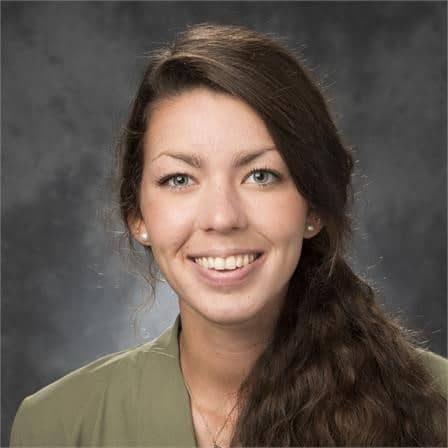
Liz Meyer Hett is World Relief Western Washington’s Communications Coordinator and serves her local offices with unified branding, content creation, and digital marketing. She has passions for organization, design, and connecting people.
Welcome to Reciprocal Hospitality
Many American Christians have good intentions, working hard to welcome immigrants with hospitality and solidarity. But how can we do that in a way that puts our immigrant neighbors first rather than pushing them to the fringes of white dominant culture and keeping them as outsiders? That’s exactly the question Karen González explores in Beyond Welcome: Centering Immigrants in Our Christian Response to Immigration, a new book coming out this fall.
Today, we’re excited to share an excerpt adapted from Beyond Welcome and hope you feel challenged to move beyond welcome as you get to know new immigrants in your community.
In many Latin American countries, hospitality is expressed in the familiar proverb “Mi casa es su casa.” It is notable that the saying includes the pronoun “su,” which stands for the formal “usted” used when talking to strangers or older people.
The phrase means “My home is your home, stranger.” How does that phrase reimagine the way we think about hospitality to strangers and immigrants? How does it move us beyond the host and guest dichotomy and into a hospitality that moves in both directions, a reciprocal hospitality?
I remember being awed when I learned that in his lifetime Jesus received and accepted hospitality and financial support from many people found on the margins of the first-century Near East: women, sex workers, tax collectors who were known for cheating people, and other sinners.
What is perhaps less known is that he also reciprocated this hospitality—though he was a man without a home as he himself says, “Foxes have holes, and birds of the air have nests; but the Son of Man has nowhere to lay his head” (Luke 9:58), he not only shared meals with people but also saw them, listened to them, accepted them and identified fully with them. He embraced them with a hospitable generosity of heart — listening, learning and engaging over and over again in his encounters with those in and outside his immediate circle:
- the Samaritan woman at the well in John 4
- his disciples on the road to Emmaus in Luke 24
- in conversation with the Syrophoenician woman in Mark 7
This reciprocity is exactly what is often missing in modern rhetoric around hospitality to refugees and other immigrants—that hospitality only moves in one direction: from the native citizen with rights to the immigrant in need. I am not referring to the kind of hospitality where an immigrant person is invited to a citizen’s home for dinner, though that is one kind of hospitality.
What I am referring to is the kind of hospitality that is truly engaged, where native citizens listen to and learn at the feet of immigrants they have welcomed to their countries—the kind where immigrants are asked to give feedback and evaluate services we receive, including resettlement; the kind where immigrants are at the table and asked to speak into the planning of programs and services that serve our own communities; the kind where our dignity and choices are respected and decisions are not made on our behalf.
When hospitality is not reciprocal, those belonging to the dominant culture unconsciously begin to think of immigrants as having less in every way. The truth is that immigrants may need material possessions, language classes and other services, but as image bearers of God, we have gifts, talents and skills, not just needs.
It is important to revive the biblical practice of reciprocal hospitality in order to counteract these toxic narratives.
In her book Making Room: Recovering Hospitality as a Christian Tradition, Professor Christine D. Pohl writes, “There is a kind of hospitality that keeps people needy strangers, while fostering an illusion of relationship and connection. It both disempowers and domesticates guests while it reinforces the hosts’ power, control and sense of generosity. It is profoundly destructive to the people it welcomes.”
Without reciprocal hospitality, we unwittingly reinforce the status quo and unequal power dynamics—this action mars the image of God in our immigrant neighbors and widens the distance between us. Hosts have something to offer to immigrants, but immigrants have nothing to offer to hosts. When hospitality is reciprocal, it encourages the hosts’ humility and diminishes the impact of the disparate power dynamics in the room.
In John 14, as Jesus prepares for his death and for leaving his disciples, he says to them, “Do not let your hearts be troubled. Believe in God, believe also in me. In my Father’s house there are many dwelling places. If it were not so, would I have told you that I go to prepare a place for you? And if I go and prepare a place for you, I will come again and will take you to myself, so that where I am, there you may be also.”
The one who has been received, fed, and cared for in many homes will now return to his home to prepare a place for them in his own Father’s house—a reciprocal hospitality. They wouldn’t be just guests in the house but family, welcomed in “Mi casa es su casa” style!
You can pre-order Beyond Welcome: Centering Immigrants in Our Christian Response to Immigration here!

Karen Gonzalez serves as the Director of Human Services at World Relief. Shes is is the author of The God Who Sees: Immigrants, the Bible and the Journey to Belong, and Beyond Welcome: Centering Immigrants in Our Christian Response to Immigration.
Building a Community of Safety and Belonging
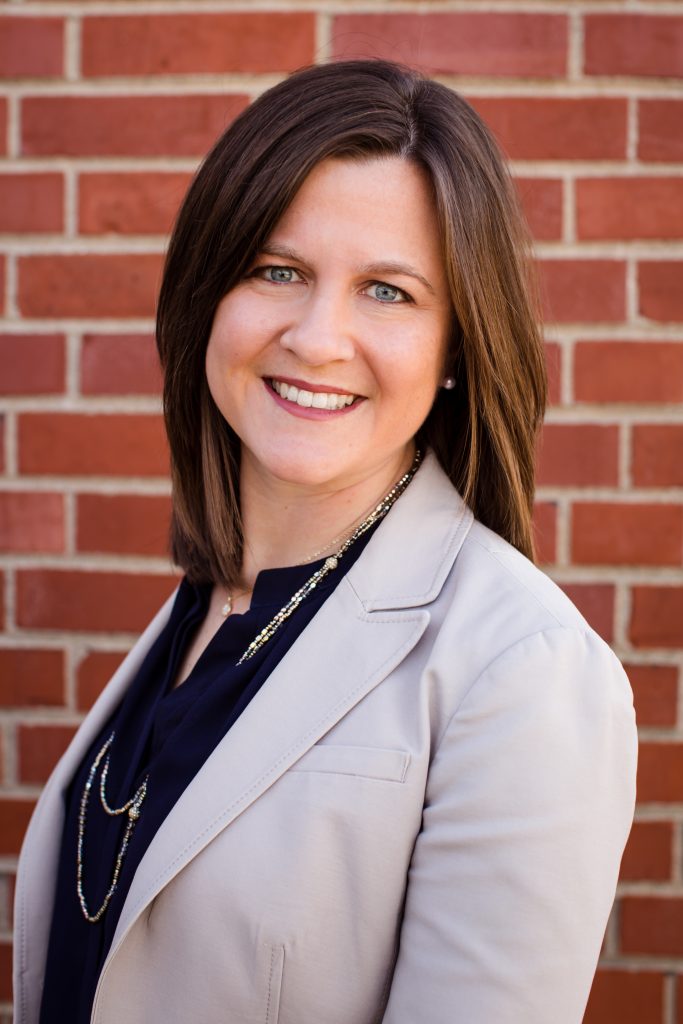
A reflection from World Relief Chicagoland Executive Director Susan Sperry.
June is World Refugee Awareness Month. And on June 20th, we celebrate World Refugee Day. This year, the theme of World Refugee Day is focused on the human right to seek safety.
Whoever they are, people forced to flee should be treated with dignity. Anyone can seek protection, regardless of who they are or what they believe. It is non-negotiable: seeking safety is a human right.
Wherever they come from, people forced to flee should be welcomed. Refugees come from all over the globe. To get out of harm’s way, they might take a plane, a boat, or travel on foot. What remains universal is the right to seek safety.
Whenever people are forced to flee, they have a right to be protected. Whatever the threat – war, violence, persecution – everyone deserves protection. Everyone has a right to be safe.
UNHCR
Who are the people seeking safety?
This is a time of visible conflicts. You might think of Ukraine. There are millions of others who have fled their homes due to less-publicized conflict in places like Ethiopia, Myanmar, or South Sudan. Many of these people become refugees. And during Refugee Awareness Month, it is important that we tell their stories of leaving home to seek refuge.
And yet there are others too – people who arrive in the United States seeking protection from violence because of their identity, religion, or views.
June is National Immigrant Heritage Month, so we also have the time to consider our immigrant neighbors who left beloved homelands, friends, and family…to seek safety and a place to live freely.
This month, I am reflecting on the key reason why both refugees and immigrants must have the right to seek safety: each one is a human being. Those of us who follow Jesus believe in the concept of the “Imago Dei”: that each person is made in the “Image of God.” Let’s explore a few reasons why that makes such an impact on how we treat our immigrant and refugee neighbors.
1. Remembering the Imago Dei Transforms Our Relationships from 2D to 3D
I recently had a conversation with a pastor about what it means to cultivate deep relationships. This pastor framed the conversation as taking a relationship from two dimensions (2D) to three dimensions (3D). By necessity, all of us have “2D” relationships. There are people we know of and we know about, but we don’t know in-depth. We know their outer image, but it’s more of a caricature. We may not think of them as a complex individual with the same level of joy, pain, and experience that we have.
A person becomes “3D” when we spend time together. By talking, laughing, eating, and being human together, we gain insight into their joys, pains, dreams, and fears. When we share life together, we become better able to see the image of God in the person before us and also recognize it within ourselves.
That’s also how we begin to understand each other’s potential. We recognize their capacity to love, create, and build relationships — and that those are qualities we share by virtue of being humans, created in the image of God.
Relationships that move from 2D to 3D begin the process of building community. And in community, where we recognize each other’s humanity, potential, and limitations, we can create safety and space for each other to thrive.
2. Developing Relationships and Belonging Requires Time
In more than 20 years with World Relief, I have seen thousands of people resettled and thousands more immigrants become a part of the World Relief community in Chicagoland. And I have experienced the many ways that being together in community is rewarding and transformative for all involved. In my friendships with immigrants and refugees like Deborah, Jerome, Mohammad, Durmomo, and many others, I have gained an appreciation for the way that the image of God manifests in the creativity, wisdom, and compassion of those around me. Keep an eye out for an upcoming blog series from my friend Durmomo about this!
In each of these friendships, investing time with each other has transformed a 2D image in my head into a 3D understanding in my heart. I am deeply grateful for how these relationships and how we continue to shape each other.
3. Our Value as Humans Gives us the Right to Seek Safety
Christianity, and many other faiths, emphasize the fact that human life is precious. This common thread across cultures is backed up in the theological belief of Christians, that humans created by God and loved by Him, are valuable and important. When someone’s life is threatened, they should have the right to seek safety so that they can experience peace, a relationship with God and others, and the opportunity to use their God-given talents and passions. As Christians, we can protect that opportunity by creating a welcoming space.
I believe that together, we can form a movement to serve the vulnerable people among us. That includes extending safety to refugees and immigrants who have fled war, violence, and persecution and allows us to see the value in every human life. We welcome them. Whoever they are, wherever they come from, and whenever they arrive.
Continue reading:
Ali’s Story: A Refugee Pharmacist Using His Career to Give Back to Others
Finally, I’m Home: Raphael’s Story of 8 Years Waiting for Resettlement
Reflections on Motherhood, Privilege and War
This afternoon my husband built our son a playhouse. Ten minutes was all it took to assemble the basic sand-colored canvas, another ten to fill it with plush blankets and toys. As the sun streamed through our living room window and my husband marveled at the safe, sweet little space he’d built for our son, I thought of Ukraine.
How many millions of families would wish right now for that safe little canvas playhouse, assembled in more time than it took Putin to turn their homes to rubble? I wonder what they chose to take with them in those ten minutes, as they pulled their babies from their beds and fled.
Viewing war and suffering through the lens of motherhood is a new experience for me. It’s raw and visceral and hard. So much harder than before. I feel connected to the millions of women fleeing Ukraine in ways I’ve never before felt. An experience, it seems, that is clearly felt by mothers all over the world as we hear about women like Lubomira, who fled Ukraine with her three daughters and three-week-old, premature son, leaving behind her husband to the mandated military conscription.
The plight of these women is almost incomprehensible to me. And it’s brought me to tears again and again as I sit with my baby boy.
As I feed him, I think of the children in Mariupol, who have been cut off from food, clean water and basic necessities for weeks.
As I rock him to sleep to sweet lullabies in his nursery, I think of the babies lining the floors of loud, overcrowded bomb shelters.
As I watch his daddy play with him, I think of all the fathers left behind. The women and children who have lost their partners and protectors during the scariest time of their lives. I think about the fact that 90% of the 4.3 million refugees are women and children without husbands and fathers — a million families separated.
Truly, I cannot comprehend the fear, the pain and the suffering. In these moments, I’ve cried out to God for mercy. Lord, what can we do?
It’s easier to shut it out. To turn it off when it all gets too much. When the headlines and images become unbearable. But then I remember, the mothers of Ukraine can’t do the same.
They can’t turn off the bombings, the sirens or the shouts of Russian soldiers. They can’t turn off the cries of their babies, their growling stomachs, their chattering teeth. They can’t distract from the knot in their throat, the pit in their stomach. They don’t get to switch the channel.
And so, nor will I.
I will bear witness to this moment. I will feel it all. I will ask God for the courage not to look away. And I will remember it’s hard for a reason. The pain in my chest. The nausea in my stomach. The knot in my throat. It’s there as a reminder that we’re not meant to shut off from the suffering of humanity. It’s our hearts, our souls, our bodies, telling us to act. To do something, anything, to help.
Will you join me in praying for the mothers of Ukraine, and the millions of mothers caught up in war and violence around the world today?
Lord,
Thank you for the extraordinary gift of motherhood. Thank you for the way it connects us, transcending culture, geography and time in its shared experience. Thank you that in times like these, it draws out the very best of our instincts to love and support. Thank you that in mothers you created a superhuman strength, one that can come only from you. Grant all of us the grace to channel this type of strength.
Lord, today we see this strength in the mothers of Ukraine. We cry out for your loving protection. We ask that you embrace these mothers in your arms of tender care. Guard them and pour upon them your comfort and strength. Give them the stamina to survive the pain and despair this war has brought. Remind them, Lord, that you have not forsaken them nor abandoned them, even in their darkest hour. Give them the words to comfort their children, and one another, as they are separated from their families by distance or death. Bless them with a peace that surpasses understanding, and remind them of your love for them each and every day.
God, we pray this prayer today not only for the mothers of Ukraine, but for all mothers caught up in war and violence around the world today. Place their hope in you Lord, so that it might renew their strength. Allow them to run and not grow weary, walk and not be faint. Pour out your love and peace upon them, Lord God, on this Mother’s Day, and every day.
In your name we pray,
Amen.

Francesca Albano currently serves as Director of Branded Content at World Relief. With a background in Cultural Anthropology and a graduate degree in Strategic Marketing Communications, she connects her interests in societal studies and global cultures with her training in brand strategy and storytelling. Francesca is especially passionate about grassroots community development and the treatment and advancement of women and girls around the world.
Alexis Dubreuil: Intern Reflection
I’ve always considered it a blessing to have been raised in an environment that exposed me to different types of peoples and cultures. I am one of a lucky few to have this blessing; the potlucks at my churches always presented a beautiful array of food originating from the Middle East, Southeast Asia, the Caribbean, and South America. I prided myself in knowing that I was never truly a victim of culture-shocks—embracing and celebrating differences was natural— exciting, even.
Additionally, as a French major and an International Studies major with a political science emphasis, I have spent the past two and a half years delving deep into the histories, cultures, and current political environments of many different countries. I speak French and Spanish well enough to conversate. These are all things I was able to tell the Intern Coordinator at World Relief, a Christian based non-profit organization that works with helping refugees upon their entrance to America, that I believed both qualified me and made me excited for a position.
I became an intern at the Spokane location twice a week for 4-7 hours a shift under the lead Job Developer for refugees. Her job, as written, was to help connect refugees after they have settled in their first few weeks, to potential employers so that they can become self-sufficient. In my head, I imagined my job would be meeting with incoming refugees, interviewing and writing resumes with them, and connecting them directly with hiring jobs in the area. I was expecting to form relationships with the cases I worked with, and to utilize my cultural competency to navigate barriers in communication.
Scratch that.
The stress, confusion, and disarray that was the U.S. removal of troops from Afghanistan shifted my role completely. This fall, World Relief was pressed for donations, for volunteers, and with the creation of a new Afghan parolee system specifically for helping the extremely large influx of Afghan refugees, all hands were on deck. It was an extremely unique time to start working for the organization—no longer was my role to simply be writing resumes, but, as my director explained, I wore many hats.
On a day-to-day basis, I juggled many tasks: sometimes I was taking my clients to job interviews, sometimes taking them to doctor’s appointments, and sometimes picking their kids up from school, and sometimes doing all of that and then some in a single afternoon. I had to learn how to drive and park a ten-seater van during my time there so I could help drive big families. My supervisor was amazing, and believed in the relationships formed more than just the bare minimum of the job, and wanted the same for me. I met with clients, but I also went to their houses, I brought their kids toys, and I helped them move to different apartments.
Forming these relationships could not have been more rewarding. Although knowing Dari, Pashto, Vietnamese, or Swahili would have been much more useful than French, I was able to connect to Francophone clients in a way that my coworkers could not. I became close to one of my clients from Congo, a young mother with four kids. Getting to know her and her kids was a highlight of my internship; seeing how she cared for her kids and engaged with all of the resources World Relief had showed her ambition to build a new life. It is so obvious to me that refugees in America are driven and intelligent. It is beyond me how anyone could claim that refugees and migrants have nothing to contribute when they are the people that seize every opportunity to build this country up.
However much joy there can be with working with refugees, working with people exiled from their country also requires a lot of sensitivity. Sometimes clients would share, sometimes they would not—seeing refugees not just as people immigrating, but as people that have had their lives completely changed (for many, in a matter of days), calls for empathy from the staff.
A client walked in one morning to speak with my supervisor, and was telling me a bit about the Taliban activity in his village far from Kabul. He showed me pictures of hundreds of Afghans standing in a plane, packed like sardines to get to America. Afterward, he told me about his family that had to escape to Kabul where they would not be identified as being associated with him at all. This was because he drove trucks that transported goods to the US military as work. I was in charge of this individual’s entry interview, and I remember asking him, “You’ve been here for about a week, what do you like most about Spokane thus far?” He replied, “Me and my family are safe.”
While every refugee’s story is different, most of the refugees I spoke with had stories just as intense. They made me think hard on everything I take for granted in the US. While the United States has plenty of its own pressing problems and structural issues, I have never feared for my life in the way many of these individuals have; it was a very unique time of reflection for me.
Besides the work itself, the work environment was absolutely amazing. I think the work environment is unlike any other. My colleagues embody family. They care for each other and for their clients, and it is reflected in how many clients come back to either work for, work with, or simply spend time with the staff of World Relief. They are extremely driven towards their mission, and love working with interns and volunteers. I recognize that my experience was unlike any other, and I am grateful for everyone I met and every experience I had.
As I move forward in my career, I will always think of the dedicated staff and driven refugees at World Relief.
Alexis Dubreuil interned with World Relief Spokane during Fall/Winter 2021. She is a student at Whitworth University studying International Studies and French. Thank you for being part of our team, Alexis! Click here for a list of available internship opportunities.
From Welcomed to Welcomer
At the end of April, World Relief will celebrate National Volunteer Appreciation Week, a time to recognize the impact and power of volunteers to “tackle society’s greatest challenges, build stronger communities and be a force that transforms the world.”
Last year, World Relief engaged 8,430 volunteers and 873 church partners in the U.S. to welcome and walk alongside their refugee and immigrant neighbors. Today, Todun Afolabi, World Relief’s U.S. Volunteer Engagement Manager, shares her own journey from welcomed to welcomer.
The Ministry of Welcoming
When I think about God’s heart for welcoming strangers, I think of Ruth and Naomi’s story in the Bible.
Naomi was the mother of Mahlon, Ruth’s first husband. Naomi’s family had traveled to Moab because of famine in Judah. While displaced from their homeland, Mahlon met and married Ruth, a Moabite. But when Mahlon and his father died, Ruth and Naomi returned to Judah as widows.
Naomi knew what it was like to be a stranger in a foreign land, and she was instrumental in helping Ruth resettle in Judah. She showed her how to secure food and, eventually, even connected her with her future husband, Boaz. Through Naomi’s care and advice, Ruth was able to establish a new home.
Needing a Naomi
For me, welcoming newcomers is ministry — and it’s personal.
When I was a stranger in a foreign land, there were many “Naomis” who spoke into my life and helped me adjust to my new home. I’ve learned that you can’t downplay the role of God in your life, especially in how he connects people and brings them together.
In 2011, my husband and I came to the U.S. from Nigeria as newlywed graduate students. As a couple, we couldn’t stay on campus, so we found a small apartment. At the time, we didn’t have enough money for furniture. We were just glad to have a roof over our heads.
We soon started attending a local church, and one of the pastors asked how we were adjusting and if we needed anything. I was hesitant to acknowledge how little we had and how far from home we felt, but we couldn’t hide our needs.
Later that week, I was amazed when the pastor called and asked if we were home. Within minutes, this truck drove up with chairs, a table, a dining room set — everything needed to make the apartment into a home for us.
That was the first of many ways the church surrounded us and helped us through our early years in the U.S. — and as a married couple! Our first car was donated to us by the church. They helped us cover rent expenses when money got a little too tight. When I got pregnant with our first child, they bought maternity and baby clothes and celebrated with us when our son was born.
I think God allowed me to experience the church’s welcome first-hand so I could understand how important it is. They showed us the heart of Christ. Now in my position at World Relief, that same heart motivates me to help others welcome newcomers the way I was welcomed.
Becoming a Naomi
When I joined World Relief as the Chicagoland Church and Volunteer Coordinator in Dupage-Aurora in 2018, it was an opportunity to become a Naomi for others.
I remember meeting a young woman who had recently arrived in the U.S. from Rwanda, and I was telling her my story — how I came and what had happened in my life since. She told me, “If you can do it, then I can,” and I said, “Yes! It’s possible. It’s really possible!”
It’s powerful to see that lightbulb go off, to see the encouragement and the hope that comes when someone realizes that they can do this — and that they don’t have to do it alone. That’s why I’m so passionate about helping the welcomers know and express the heart of God for strangers.
I wanted to keep bridging the gap between churches, volunteers and newcomers not just in Chicagoland, but across the country. In 2021, I transitioned to a role with World Relief’s Home Office as the U.S. Mobilization Specialist and now, I’m the U.S. Volunteer Engagement Manager.
In each of these roles, I’ve seen the mutual transformation that happens when churches and volunteers work together with their newcomer neighbors to welcome them — just like I was welcomed.
Welcome is for Everyone
At World Relief, we want to make room for everyone to be a part of welcoming newcomers, and I’m especially excited to invite those who have immigrant stories like me to volunteer with us. We can play an important role in being Naomis to our new neighbors, helping them adjust and adapt, just like we did.
It was a Naomi in my life who introduced me to volunteering. I started helping at a local food pantry and discovered that it was a good way to give back, but also an opportunity for me to build relationships and integrate. I realized it was a way for me, as an immigrant, to say, “This is my community now, too.”
I’ve learned that — whether you’re an immigrant, refugee, asylum seeker, a church partner or anyone else in the community — you have something to give. Even if it’s an hour a week or giving someone a ride to an appointment, those things really have an impact. I know because they had an impact on me!
Volunteering is where we get to bridge the gap between the heart of Christ and the needs of our community.
I look at my experience and see God’s hand in all of it — in the way I was welcomed and the way I now get to help others welcome. I’m grateful for this ministry God has given us at World Relief, and I’m grateful to have churches, volunteers, neighbors and people like you ministering together with me.
Do you want to create lasting change alongside passionate, mission-driven coworkers like Todun? World Relief is growing our team to meet the increased needs of our world, and we’re looking for people like you to join us.

Todun Afolabi joined World Relief in 2018 and currently serves as the US Volunteer Engagement Manager. With a background in law, she is passionate about humanitarian efforts and engaging communities in their stories of change.
Women and Men Leading Together
“So God created humankind in his own image,
in the image of God he created them;
male and female he created them.”
– Genesis 1:27
In the Beginning
In the beginning, God created — God separated the land from the sea; made plants and animals, fish and birds, men and women. When it was finished, God looked around at all that had been made and called it very good.
As a woman, I (Nancy), have sometimes struggled to understand what very good means for me. Like so many women across the world, I grew up in a society that viewed men as superior to women.
I was taught to believe that God was a man and that women were the cause of all the troubles and hardships that humans currently face because women sinned first.
In my work as a Monitoring & Evaluation Manager and Integral Mission Coordinator at World Relief Kenya, I often engage with pastoral communities who hold very strong beliefs about women and their positions in society. There have been times when I have felt like I am not good enough due to the way people have reacted to me and the directions I give them.
And yet, despite all this, God is at work.
God’s Vision for Gender Equality
I never dreamed that working at World Relief would transform the way I view myself and other women. But that’s what happened when, in 2021, my colleague James and I walked through a curriculum called Women and Men Leading Together. World Relief is currently rolling out this curriculum to a majority of its international programs staff.
This curriculum lays out a biblical foundation for gender equality by looking at five key points:
- Imago Dei – we are made in the image of God
- Patriarchal Cultures – how they harm both women and men
- Jesus’ Radical Example of Redemption and God’s Original Design for Marriage
- The importance of using rules of interpretation when reading scripture
- Organizational Leadership and countering gender inequality in the workplace
Over the course of eight weeks and seven learning sessions, we learned that men and women are created equally in the image of God, a concept often referred to as Imago Dei. And while men and women are two different expressions of God’s image, the authority to “practice dominion over all the earth” has been delegated to us equally.
We also gained a deeper understanding of the patriarchal cultures we live in, and how cultural norms can often trap both men and women into harmful gender stereotypes.
Culture often tells men that they must be the protector and provider and that they should be the opposite of women, never showing any emotion or gentleness. On the contrary, women are told they are weak, less than men and should yield all leadership and authority to men.
Both of these viewpoints, however, fall short of God’s desire for the freedom and flourishing that God intends for each one of us, regardless of our gender.
God’s Word is Powerful In Us
As we worked through the curriculum, I (James) gained an expanded understanding that everyone — women and men — are gifted and can serve in any capacity. A person should not be judged because of their gender, and everyone deserves equal respect. Jesus, himself, had women in his inner circles. He taught them and invited them into leadership alongside him.
The training helped me to be even more deliberate in being mindful of others, especially across the gender divide. We are all gifted and endowed, and we need to support one another.
The biblical references were very enlightening and helped me see that some of the arguments against gender equality that I had grappled with previously were based on a misinterpretation of scriptures. I now feel more equipped to advocate for gender fairness in the community, and I have the knowledge and basis needed to back up my viewpoint.
For me (Nancy), learning about the examples of powerful women in the Bible like Deborah, Esther, Ruth, Naomi and Priscilla was very encouraging in my faith. I am stronger and more confident and have begun stepping up to lead more in my local church and at my place of work.
The Holy Spirit revealed to me that I am a child of God, fearfully and wonderfully made in his image. I should not fear anything for God is always with me and will never forsake me. As Psalm 121 says, my help comes from God.
Carrying the Vision Forward
The transformation we have experienced and the understanding we’ve received has now given us the opportunity to teach and train others on our team, in preparation for incorporating more gender-equality work in our programming.
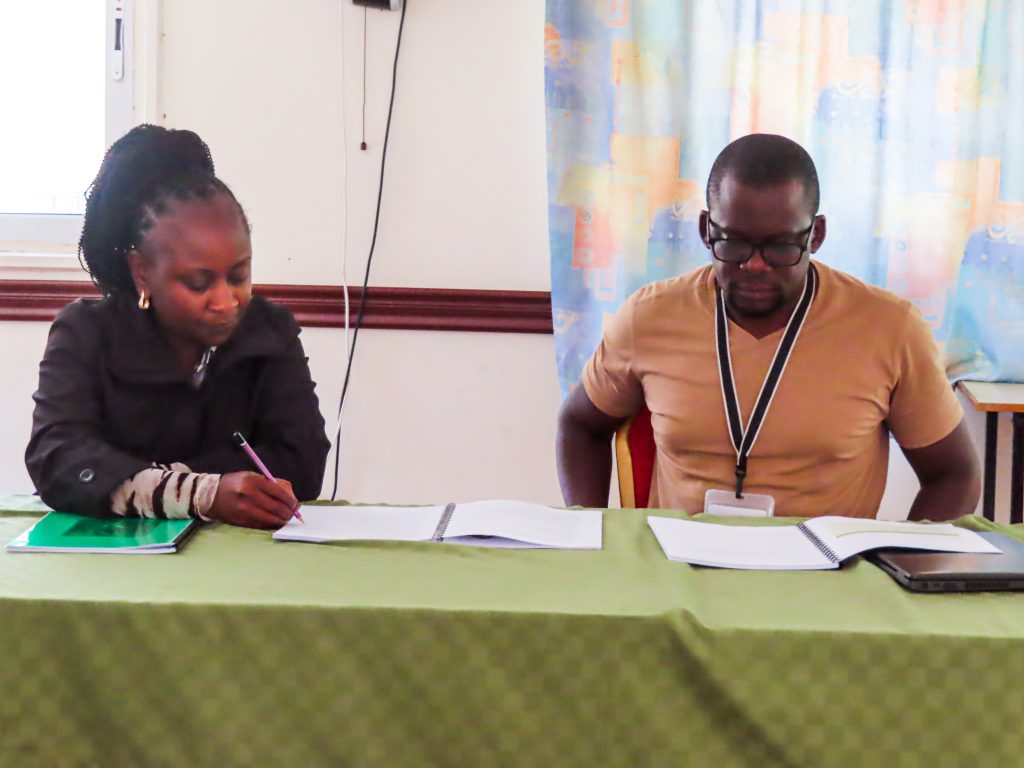
We have noticed that many women in our workplace, especially in our field offices, seem to lack the confidence God longs for them to have. They often stay silent or hesitate to address others in public settings. It is up to us as leaders to walk with these ladies, intentionally giving them roles in workshops as a way of building up their confidence as they grow.
Research from the World Economic Forum, Pew, Harvard Business Reviews and others have shown that organizations are more successful where women are equally represented in leadership.
Not only that, but elevating women in leadership and leading alongside one another as equals is a call to be counter-cultural. We get to follow Jesus’ example and counter the effects of gender bias in the workplace.
Men also have a very vital role to play in combatting gender inequality in the workplace. In most cases, gender authority and imbalance is in favor of men. Men, therefore, have to use their positions of authority to be the agents of change that are needed to create a gender-equal world. And men can begin this transformation by changing how they treat their wives, daughters and mothers right within their own homes.
As we, and others across World Relief’s global offices, continue to engage with this training, it is our hope that our fellow staff members, church partners and volunteers can approach this curriculum with an open mind, be willing to learn from what was God’s original intention at creation and adjust our actions accordingly.
In Kenya, we have already seen our entire staff team be more keen on reducing gender bias in our day-to-day work and conversations. Moving forward, we are committed to assessing our progress not just through our interactions with one another, but through our staffing and leadership structure, mainstreaming gender activities across all our programming, and working to ensure our policies and procedures align with our gender-inclusive vision.
We are grateful for the work that God is doing in us and among our team to bring healing and restoration to our world. God’s word is, indeed, more powerful through us because of the work the Spirit has done within us.
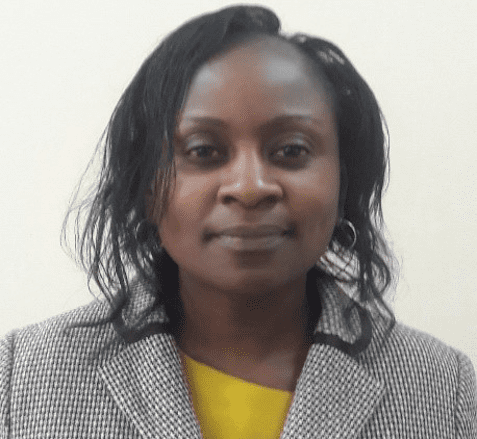
Nancy Nasirumbi Owola joined World Relief in 2017. She is a social entrepreneur with a passion for serving the most vulnerable through teaching business skills to those disadvantaged or underprivileged in the community. Nancy has worked in community development since 2006 and has also worked as a consultant, offering technical support to 20 Kenya Community Development Foundation partners in Value Chain Development & Enterprise Development. Her professional background includes entrepreneurship, monitoring & evaluation, business administration & management, and marketing. Today, she serves as the Integral Mission Coordinator as well as the M&E Evaluation Manager for World Relief Kenya.
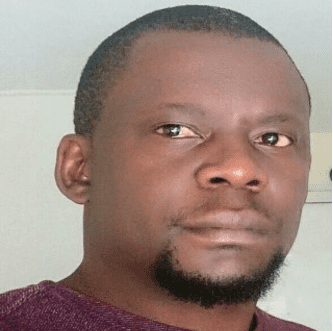
James Wanda joined World Relief Kenya in May 2020 as the SCOPE and National Health Manager. He graduated with a Bachelor of Science in Nursing from Moi University and has a Diploma in Project Management from Kenya Institute of Management. He is currently pursuing a Master’s Degree in Public Health at Jomo Kenyatta University of Agriculture and Technology. With more than 15 years of experience in public health programming, he’s worked with organizations such as The Walter Reed Project, Catholic Medical Mission Board, Jhpiego Kenya and AMREF. Prior to joining World Relief, he worked as a Project Manager and acting Executive Officer for Kenya Pediatric Association. James believes in justice and fairness to all and service to humanity is his call.
Efoe Davis: Resettlement Through the Eyes of a Caseworker
Efoe Davis is a caseworker at World Relief Western Washington in our King County office, who regularly meets with individuals and families as they transition to their new life in the U.S. Here, he shares the joys and challenges of resettlement from his vantage point:
The Challenges
On December 20, 2021, I greeted a family of seven from Afghanistan: a mother, father, and five children. They had just arrived in the U.S., and I was their caseworker. After fleeing Afghanistan, they spent time on a U.S. military base as the lengthy paperwork was processed. They finally arrived in Washington and a new community, yet had experienced so much uncertainty, trauma, and waiting in the process. I see a lot of grief and pain in the people I work alongside.
Language and communication are just two elements that can be very challenging as a family resettles in the U.S. This family and I worked so hard to communicate about questions, concerns, tasks like grocery shopping, and how to navigate resources. One of the kids speaks some English, the rest only speak Dari, so we used interpreters when we could, and also lots of translation apps!
Another challenge for families when they first arrive is finding permanent housing, especially for larger families. How do you find a home before you have a job? How do you find a job without a permanent address? How do you find an affordable three-bedroom apartment in King County? These are the types of challenges people face when they arrive, and I get to help them navigate these questions as they work toward self-sufficiency.
The Joys
When this family first arrived, they stayed in two different Airbnbs and a hotel before we found permanent housing last month. As a caseworker, I’ve been surprised and encouraged by how community members have been so supportive and kind. During this family’s stay at their first Airbnb, the owner frequently checked in on them to see if they needed anything. And when a snowstorm hit, she asked if they needed warmer clothes. With their resounding “yes,” she gathered some community support and helped them find the clothes they wanted.
Some of her neighbors got connected to World Relief after that, and are now supporting refugee resettlement through financial donations. Seeing how invested people are in this work reminds me that there are people in the world who have genuine hearts and are willing to do anything to help others in need. It felt like a spiritual connection to have this family at the Airbnb and to know that they (and I!) had the support of the community.
No Two Alike
Each case I work with is so unique. In my experience as a resettlement caseworker, I have seen a wide variety of families. Some are extremely easy-going, open-minded, and able to adapt quickly. Other families come with high expectations and very specific ideas of how they want things to go. But everyone arrives with some experiences of trauma and loss.
Sometimes, I receive praise and gratitude from people, and sometimes people yell at me or are verbally aggressive when things don’t go their way. People come with so many different experiences, personalities, histories, and expectations. I think part of my role is just to be with people as they are, and not force them into a box of how I think they should be or act.
As an immigrant myself, I understand the difficulties of resettling in a new place, especially when language is a barrier to progress or communication. I feel very grateful to help so many families coming here for the first time to find a home, a community, and a new and better life. I am also grateful for this community and the ways you have made resettlement just a little bit easier for these families.
– Efoe Davis, World Relief Caseworker
Check Out World Relief Resettlement Services in Western Washington:
From Ukraine to the United States: Bohdan’s Story
On February 24, 2022, Russia launched a full-scale invasion of Ukraine, plunging the nation into violent conflict. This act of war highlights how violence places innocent lives in danger, and we continue to pray for all those affected. In the last 18 years, World Relief has resettled over 13,000 refugees from Ukraine. Many, like Bohdan Borodin, have joined our staff, and we serve together daily.
Bohdan came to the U.S. with his family in 2019 through the Lautenberg program and now works as an Employment Specialist at World Relief Upstate. Today, Bohdan offers his perspective on life in Ukraine, the transition to the United States after suffering from religious persecution and hope for a better life for his family.
We are grateful to Bohdan for sharing his story today.
I love my country. Before I came to the U.S., life in the Ukraine wasn’t all bad. Ukraine is a good country, actually. It’s beautiful with so many different landscapes: from flatlands to mountains and lakes.
I miss the community and routines of daily life, including family dinners every Sunday. It was a big event, all of us coming together and talking with one another over a meal. I also received a good education in Ukraine, earning a Master’s Degree in Thermal Engineering.
But while it sounds like a degree that can secure a good job, it was not so easy to provide for basic needs for my family or plan well for our future.
In 1991 Ukraine was liberated from the USSR and established as a democratic government. Since then, a lot of good changes have happened, but the economy has remained challenging: the poor get poorer and the rich get richer.
Our culture is also still sprinkled with communism-bias in every city and village. When Ukraine was part of the USSR, Khrushchev, the First Secretary of the Communist Party from 1953-1964, announced on TV that he would try to kill the last Christian to destroy the faith of all Christians. Thankfully, this threat never became a reality. Instead, persecution now is much more subtle, with undertones of dislike and prejudice.
For example, as a student, if you have a teacher who remembers the former Soviet way of life and has upheld those beliefs, he or she may give you bad grades just to show their disapproval of Christianity.
It is for that reason that my wife, Inna, and I decided to apply for refugee status and come to the U.S. for a better way of life.
It took about three years from the start of the application process to the point that we resettled in South Carolina. When we were finally approved to come to the U.S., we were excited, but I also knew that entering a different culture and language would be difficult. In fact, our challenges first began before we ever left Ukraine.
We were waiting at the airport standing outside in the middle of winter with our two-year-old daughter. We made it from Ukraine all the way to New York. But then our flight from New York to Greenville was delayed twice and eventually canceled. We were exhausted!
We finally arrived in South Carolina with only a couple hundred dollars in our pockets since we had no property to sell in Ukraine. Also, my wife does not speak English, which was an additional challenge for her. And shortly after we arrived, my mother-in-law came to live with us. All of this change created a very stressful time!
I had studied English back in Ukraine, which gave me a huge advantage compared to other Ukrainians with no English. While I wanted to remain as self-sufficient as possible, we still had a lot of needs as we navigated setting up our life in a new country.
Thankfully, when I did need help and guidance, World Relief workers stepped in to help with things like filling out papers and documents, securing a place to live and getting a job so I could provide for my family.
When World Relief saw how good my English was, they offered me a job working as an Employment Specialist. At first, I was unsure if this would be a good fit because my previous experience was working in technical fields, but then I thought this might be a good opportunity for me to learn something new.
I like engaging my brain and helping others, and working at World Relief lets me do both! Working at World Relief has also helped me gain more global awareness about refugees coming from countries who have even greater challenges to overcome than I have. I am grateful for that.
Most of my family still lives in Ukraine. Recently, we were able to visit, and it was a good time for my mom to give a hug to her grandkids and meet my eight-month-old son in person, instead of over the phone.
Since most of my relatives are still over there, the recent events between Russia against Ukraine have been frustrating and upsetting.
I would ask Russian people not to believe in Putin’s lie to his nation. I also believe that there are many Russians who don’t want this war either. My hope is that they would continue coming out on the streets, sharing their opinions through protests.
I also hope the American government will find or create a way to bring immediate family members from Ukraine to the U.S. Despite this ongoing tragedy in my home country, I am grateful to be in America and give my kids the opportunity to live the American dream. I want to give them the best life that I can – to receive a good education, become self-sufficient and achieve success in this life.
World Relief is providing life-sustaining relief through our network of partners on the ground in Western Ukraine, Slovakia and Romania. Your gift today will provide things like food, temporary shelter, blankets, hygiene items, medicine and other essential items to those displaced by the war. Whether we’re responding to war in Ukraine, drought in Kenya or flooding in South Sudan, our faith compels us to respond.
Bohdan Borodin grew up in Ukraine, and resettled in the U.S. in 2019. He has a wife and two children. Together, they live in South Carolina where he works as an Employment Specialist at World Relief Upstate











